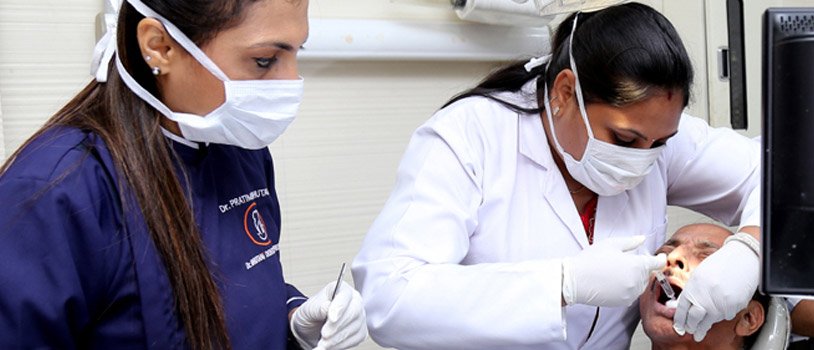Just to describe the oral parts, problems and treatment procedure dentists and their staff use a variety of terms. Such dental terms are often used in the course of delivering oral care to patients. While most of the experienced individuals are familiar with these terms, dentists and dental assistants new to clinical practice have a tough time understanding and memorizing such words.
At Dental Courses in Delhi, we’ve created a handy glossary of dental terms that would help you familiarize with the popular clinical terms. This dental glossary would not only help you stay at ease while in the presence of experienced dentists, but also let you come across as a proficient dentist.
A
- Abrasion: Loss and wearing of tooth structure, generally caused by improper brushing and Bruxism
- Abscess: A bone/tooth/soft tissue infection
- Abutment: Natural teeth supporting a dental bridge
- Amalgam: A commonly used tooth filling material
B
- Band: A metal ring encircling a tooth which is cemented as a part of orthodontic treatment
- Base: Cement used for dental restoration
- Bicuspid: Pre-molars
- Bitewing:An x-ray used to detect cavities
- Block Injection: Anesthesia used to numb teeth, lower jaw and half a tongue
- Bonding: Tooth-coloured adhesive restoration material used to change tooth colour and shape
- Bruxism: Excessive tooth clenching and grinding
C
- Calculus: Medical term for tartar
- Canker Sore: Small, shallow sores appearing in the mouth
- Caries: Medical term for cavity
- Cementum: A thin, but hard tissue covering tooth root
- Composite: A tooth-coloured filling
- Cuspid: Canines
D
- Deciduous Teeth: Primary teeth
- Dentin: Tooth structure immediately underneath the enamel and cementum
- Diastema: Space between teeth
- Dry Socket: Inflammation in the tooth socket prior to tooth removal
E
- Edentulous: Lacking teeth
- Endodontist: A root canal specialist
F
- Filling: Various materials used to restore teeth (resin, porcelain, metal, amalgam, etc.)
- Forceps: Instrument used for removing teeth
- Freeway Space: the space between the lower and upper teeth while the lower jaw rests
G
- Gingiva: Soft tissues around the teeth, i.e. gums
- Gingivitis: A gum disease causing inflammation and swelling
H
- Halimeter: An instrument that helps in diagnosing halitosis
- Halitosis: Chronic bad breath
- Hyperemia: Tooth sensitivity arising out of increased blood flow
I
- Impacted Tooth: A partially erupting tooth
- Impression: Teeth mold
- Inlay: Indirect tooth filling
L
- Laminate: Veneers made out of porcelain in laboratories
M
- Malocclusion: Poorly aligned jaws causing improper bite
- Mandible: Lower jaw
- Maxilla: Upper jaw
- Mouth Guard: Removable device used to protect teeth from injuries
N
- Night Guard: A removable device used to prevent teeth grinding
- Nitrous Oxide: Used to relieve patients of dental anxiety
- NSAID: A dental analgesic
O
- Occlusion: Contact between mandible and maxilla
- Onlay: Indirect tooth filling for restoring more than one teeth
- Oral Sedation: Any substance that’s used to diminish dental anxiety, used along anesthesia
- Orthodontist: A dental specialist that corrects teeth positioning
P
- Palate: Tissues forming the roof of the mouth
- Periodontist: A dentist specializing in children’s teeth
- Prosthesis: An artificial tooth replacement
- Prognosis: The anticipated treatment outcome
- Prosthodontist: A dental specialist who restores teeth through crowns and bridges
R
- Radiosurgery: Any dental surgery that involves radiation
- Restorative Dentistry: Diagnosis and treatment of teeth and their supporting structures
- Retainer: A device used to keep teeth in position prior to a treatment
S
- Sealant: A plastic resin that’s bonded in the pits and fissures to prevent tooth decay
- Splint: Tying multiple teeth together to increase stability
T
- Temporomandibular Joint (TMJ): The joint connecting skull to the lower jaw
- Temporomandibular Joint Dysfunction: Pops and pain in TMJ
- Trauma: Injury to teeth and the nearby soft tissues
X
- Xerostomia: A condition causing the mouth to be dry

